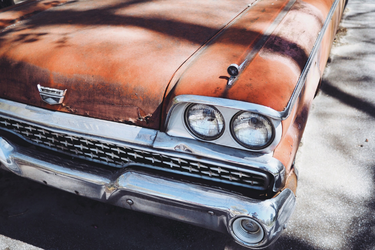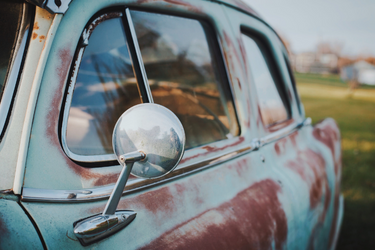
Written by Kayla Jane Barrie Updated on Feb 28, 2025 5 mins read

Rustproofing your car in Canada goes beyond keeping your ride aesthetically appealing.
Prolonged rust damage can cause mechanical and electrical parts to fail. Who would have thought rust protection could promote safe driving?
According to Statistics Canada, over 5 million tonnes of road salt is used each winter to keep roads clear from snow and ice. These de-icing chemicals can wreak destruction on our cars, leading to rust.
It can cost hundreds of dollars to repair vehicle rust. This is one of the main reasons Canadian drivers opt to get their vehicles serviced for rust. Read on to learn what causes rust and the benefits of car rust protection.
Rustproofing a car is the process of preventing rust through specific chemical applications and services. The protection against rust and corrosion is achieved by applying a barrier between the vehicle's body and external elements. Depending on the type, it can be used all over your car or only on the underside. It can last up to two years on your vehicle when rustproofed correctly.
It is highly recommended to have a used car rustproofed. Applying car rust-proof protection can limit further exposure to the elements and rust spreading. Consider how long you plan on keeping the vehicle– if you’re thinking long-term, rustproofing is great. If it’s a temporary vehicle, rustproofing may not be worth it.
According to articles, including CTV, it’s highly recommended to get your car rustproofed in the spring, not the winter.
Many of us know how harsh winter driving can be. Car rust protection can not only protect our winter drives, but it is beneficial for driving in spring. The warmer weather and humidity can create a breeding ground for rust. Aim to get the service done once a year, every one to two years.
If costs are the main concern for not getting your car rustproofed, consider these other benefits that bring value to your vehicle.
Rust is another name for iron oxide. It forms when a metal, such as steel, is exposed to moisture and oxygen for an extended period. Salt, climate, and poor maintenance all play a role in creating rust on vehicles in Canada.
There are three main types of rust on cars:
Thankfully, with proper care and getting your vehicle rustproofed, you can minimize the risk of long-term damage.
Both services are created to compact corrosion and can be done together or individually. However, the difference between rustproofing and undercoating is that rustproofing targets specific areas prone to rust (fenders, tailgate, body panels, etc) with wax. Undercoating is rubber-based sealant or wax that covers the entire underside of the vehicle.

There is some confusion around the truth of rustproofing. Here are some myths about rustproofing you should know the truth about.
Before you schedule your rustproofing appointment, it’s worth exploring your options and how they compare against each other. It’s important to know that these options are made without VOCs (volatile organic compounds) or toxins so you can protect your vehicle and the environment.
According to Cansumer, these are the top options for car rust protection in Canada.
Krown
This service takes 45 minutes to an hour, and costs begin at $120. There will be drippage for 24-48 hours after the application. Krown is a petroleum-based rust inhibitor designed to slow down the corrosion rate and acts as a lubricant for moving parts.
Rust Check
This company treats automobiles with an inhibitor from a bonded layer on the surface layer of metal, acting as a barrier to prevent water and oxygen from being absorbed. It’s non-drying and will never crack or peel. Costs start at $120, and the service lasts about an hour. There will still be occasional drippage.
Corrosion Free
This option has a higher price tag (starting at $150), but it is drip-free, and your vehicle will be done in an hour. It is designed to prevent not only rust but also stop existing corrosion. It prevents damage from UV rays too. Corrosion Free’s formula can prevent moisture from getting into small spaces you may not have noticed.
Standard policies do not cover corrosion or rust. Rust is a type of normal wear and tear on a vehicle. Therefore your auto insurance will not cover damages from it. Rust is expected to happen to cars; many insurers will not approve the claim.
However, if you have comprehensive insurance, you could be covered for rust if there was an improper repair job done on your car, or if the vehicle was damaged by flood or heavy rain. You’ll have to prove that the rust happened due to faulty repair or extreme weather.
There are a few tricks to help prevent rust from developing on your car aside from overcoating it. Here are four easy tips to help limit rust on your automobile.
Cars will cost between $120 to $150. If you are rustproofing a minivan or SUV, the costs will range between $130 and upwards to $170. Prices are geared towards the size of the vehicle.
Most new vehicles are manufactured with rust protection. If a dealership offers rustproofing as an additional service, you can save money by avoiding it – besides, who wants to increase the costs to own and drive a car?
It is not suggested to wash your car after getting rustproofing as it can remove the applied formula. Avoid using soap and detergents for at least 48 hours after the service, and wait at least a week before washing the underside of your vehicle so the product can harden adequately.
Rustproofing should be done every one to two years. Depending on your driving habits and climate, you can determine if you should go yearly or push it to two years. It may be better to consider an extended car warranty on a new vehicle purchase.
Although rustproofing won’t have a direct impact on lowering car insurance in Ontario, it can help keep your repairs and maintenance costs in check.
| Categories | Auto |
|---|---|
| Tags | Repairs and Maintenance |
Read our insurance blog to get helpful tips, information and news.
Do you have a driver in your household who’s increasing your insurance? You can remove them with the OPCF 28 or 28A excluded driver endorsement. Learn how to exclude a driver from your insurance.
OPCF 49 is a new incentive to help drivers lower their insurance rate in 2024 – but is it worth the risk? Learn about the pros and cons of OPCF 49 and how to make an informed decision, without losing important coverage.
Changing weather and light conditions can make driving hazardous in autumn. In this article, we’ve put together the top fall driving tips to help keep you and those you share the road with safe.
Did you know your insurance can increase if you are caught speeding in a school zone? Here’s what can happen if you are fined for breaking rules in a school zone.